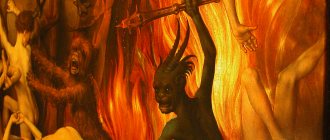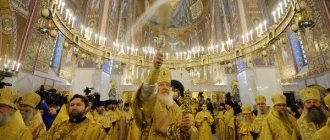Youth years
After graduating from real school in 1914, Sparrow became a student at the Petrograd Psychoneurological Institute, read a lot and searched for the answer to the eternal question about the meaning of life. Sometimes he gives away the money he saved for his last piece of bread for a book, being especially interested in philosophy, where he seeks answers to the questions that concern him.
Disillusioned with his studies, the young man drops out of college. Lost in his research, the boy becomes depressed, unable to find an answer to the question of the meaning of life. Instead, thoughts of suicide come, and in 1915 he decides to take his own life, but before that he literally screams to God, asking for revelation.
Even Nikolai himself could not subsequently explain the breakdown and enlightenment that occurred in his soul, but it was at the most terrible moment of his life that he acquired faith and saw his destiny in serving the Almighty.
Important! Reading the Lives of the Holy Fathers forever turned Nicholas away from worldly life and worldly hobbies; he saw his purpose in bringing the Word of God into the world, to fill it with love, kindness and purity.
In 1917, the young man became a student at the Moscow Theological Academy, but his studies were interrupted due to the revolution. Living in Vyshny Volochyok, he works as a mathematics teacher, a few years later he moves to Moscow and serves in the Church of Saints Boris and Gleb.
Working as a psalm-reader, he lives in semi-poverty and cold, but spends all his time in prayer and fasting, filled with God's grace, and decides to become a monk.
Return of the Prodigal Son
Among the ever-growing number of parishioners, young people are increasingly found: boys and girls attend services on great Orthodox holidays with interest or simply come to the temple to pray. Decades of Soviet power have left their mark on the minds and souls of people: now not many know by heart prayers, dates of Orthodox holidays, and the writings of saints. In order for us to better understand the content of the teachings of the holy fathers, some clergy are trying to “translate” their texts into a modern way. One of these associates was Abbot Nikon Vorobyov.
Acceptance of monasticism and exile
Bishop Feofan (Semenyako) on April 5, 1931, which fell on Palm Sunday, tonsured Nikolai Vorobyov as a monk in the St. Nicholas Church of the Kozyrevsky cemetery in Minsk, giving him the name Nikon.
Two days later, on April 7 of the same year, on the Feast of the Annunciation of the Most Pure Virgin Mary, Father Nikon was ordained to the rank of hierodeacon, and on January 8, 1933, he was ordained a hieromonk.
1933 was a time of purges in the Communist Party and the fight against “enemies of the people,” when every person was seen as a saboteur and an anti-Soviet agent, and Hieromonk Vorobyov fell under this trend.
On June 7, 1933, according to a court order, he was sent into exile in Siberia for five years.
Imprisonment did not break the faithful Christian; he withstood interrogations and torture, but did not slander anyone, did not give false evidence, but only prayed, blessing the persecutors, giving all judgment to the Lord.
Elder Nikon Vorobyov
After his release in 1937, he returned to his native land and worked as an assistant in a doctor’s house, where the whole family were ardent communists and atheists. The doctor’s wife and her sister more than once humiliated and provoked the humble and patient priest into a scandal, but in return for irritation, Father Nikon showed an example of true meekness, which won their heart.
The Path of the Abbot
The German attack, fear, and uncertainty about the future again turn people’s hearts to God; in prayer they seek salvation, liberation and support. The Soviet government allows some churches to open. Father Nikon returns to priesthood.
In 1944, Archbishop Vasily of Kalinin and Smolensk appointed clergyman Nikon as rector of the Kozelsk Church of the Annunciation of the Blessed Virgin Mary, followed by a transfer to Belev in 1948, followed by Efremov, and then followed by the Smolensk diocese, Smolensk, Gzhatsk.
The life of Abbot Vorobyov continues in difficult conditions; the Gzhat parish is in complete desolation and is in need of restoration. Poor in health, lost in the camps, the priest sets to work restoring the temple and organizing his life.
In 1956, on the feast of the Resurrection of Jesus Christ, His Eminence Michael (Chub) awarded Father Nikon the rank of abbot. Despite the fact that the priest has to work a lot physically, he does not miss the morning prayer readings and conducts divine services filled with God's zeal.
Book by Nikon Vorobyov “Letters on Spiritual Life”
In his free time, the rector of the temple works in the greenhouse and garden; his harvests amaze even experienced gardeners, and reads a lot. In his letters, Father Vorobyov would later write that it was during this difficult period that he understood what true patience and humility were.
Last years
For six years, the abbot devoted all his strength to divine services and the restoration of the church, but his health was increasingly failing. In the last year, he ate only white bread, milk and fresh berries, weakened before his eyes, but was always in a clear state of mind, filling everyone around him with amazing calm.
On the eve of his death, Father Nikon, already lying in bed, gave communion to his spiritual children and gave them instructions:
- fulfill the commandments;
- keep the faith;
- adhere to Saint Ignatius (Brianchaninov);
- leave the vanity that devastates souls.
Hegumen Vorobyov clearly understood that his life was coming to an end, thanked God for the years he had lived and often received Communion of the Holy Mysteries. He said that he had never found joy in earthly life, but joyfully goes to the Father, that he feels sorry for those who remain, for the times are coming when “the living will envy the dead.”
Hegumen Nikolai Vorobyov died on September 7, 1963 at the age of 69. The funeral service took place on September 9, after which the body of the abbot was interred in Gzhatsk.
Grave of Elder Nikon Vorobyov (Gagarin, Smolensk region)
“Try to live in such a way that people leave you comforted”
On September 7 we remember Abbot Nikon (1894–1963). Father Nikon (in the world Nikolai Nikolaevich Vorobyov) was born in Tsarist Russia. He witnessed all the tragic and great events of the 20th century: revolution, several wars, repressions, social upheavals and scientific discoveries.
The son of a peasant, smart, talented, he stood out among the six brothers for his seriousness, special honesty, meekness and kind-hearted disposition. He always wanted to get to the bottom, to find out the meaning of life, he was never a superficial person, he always looked for depth. Father Nikon retained these traits throughout his life.
He received a prediction about monasticism as a child and, having become a monk during the years of the closure of monasteries and the destruction of churches, until the end of his days he labored in the world, in the parish. Survived arrest, imprisonment, and exile in Siberian camps. He lived like an ascetic, treating himself with all severity and treating others with love. He acquired the unceasing Jesus Prayer and the gift of spiritual reasoning. His advice on spiritual life is based on personal experience and filled with the light of God's grace.
Peace in the soul and with loved ones
“Do not depart from the Lord until He forgives you and until He gives peace to your soul. A sign of forgiveness by the Lord is peace in the soul.”
“Keep peace within yourself, and then with your neighbors.”
“It’s better to mess things up, but keep peace with your neighbor, don’t forget that.”
“Try to live with everyone in such a way that people leave you comforted and thank the Lord for you.”
“Sin against one’s neighbor weighs very heavily on the conscience. And the Lord forgives such sins only when we ourselves are reconciled with our neighbor.”
“In my opinion, people should be treated like a doctor treats patients. We are all sick with all diseases, only some people have one disease, others have another disease.”
“There, that is, in the hospital, they don’t scold if someone gets sick with their lungs, heart, stomach, they don’t say: “Oh, you blind scoundrel, look, your eyes are sick!” Likewise, you should not scold each other for mental illness, but tolerate and feel sorry for each other. “Bear one another’s burdens, and thus fulfill the law of Christ,” says the apostle.”
A spark of the true self
“People are essentially, in their depths, everything is better than in their manifestation in life.”
“We are all overwhelmed with rubbish, and yet from under it the light of the true “I” flickers.”
Enmity makes all efforts useless
Hegumen Nikon (Vorobiev)
“I dwelled on enmity for a long time because it makes all efforts useless. The Lord accepts neither prayers, nor repentance, nor alms from a person who has enmity towards his neighbors.”
“No earthly truth can justify hostility. I say “earthly” because heavenly truth gives peace both internal and external. If someone you consider your enemy dies, you will suffer, because sooner or later you will feel guilty. This is usually done during prayer. If you die in enmity (let this not happen), then know that all your good deeds and all hope of salvation will perish. You will fall into the hands of those who sow enmity. The Kingdom of God is the kingdom of love and peace. Enmity cannot enter into it.”
“If we want someone to overcome himself and change his attitude towards us, then we ourselves must first completely expel hostility towards him from our hearts. Then the Lord will make his heart known.”
Don't judge anyone
“Never say bad things or ironically about anyone... Your words can be conveyed not even out of malice or hostility, but simply out of inattention or as a joke - and now, you have acquired an enemy for yourself.”
“The path to salvation is through repentance of one’s sins, and not by condemning one’s neighbors. If a person condemns his neighbors, then it means that he does not feel his sins and he has no repentance.”
“And vice versa - a sign of awareness of one’s sins and repentance for them is non-judgment of one’s neighbors. Do your work as assigned to you; don't get involved in other people's affairs; if possible, always remain silent; never transfer anything to others; like a stone in the sea, let all the words you hear drown in you; Sorry for everyone, forgive everyone both in your soul and in reality, if the opportunity arises.”
“Close your eyes to the sins of others, and if you cannot help but see, then pray for those who sin as for yourself, so that the Lord will forgive them, then you will receive mercy from the Lord.”
Offenders are our best teachers
“It is also necessary for someone to insult us, but not without any reason, but in such a way that some shortcoming is revealed, even if exaggerated. I’m not speaking from theory, but I have experienced the benefits of this more than once and I say with complete conviction that offenders are our best teachers.”
Read more good books
“I advise you again: read more good books. There are few people from whom you can get anything, and they are often busy or sick, but you can always read a book.”
Don't be afraid of anything
“Don't be afraid of anything. Instill in yourself the thought that throughout the whole world not the slightest movement occurs without the knowledge and permission of God.”
“The Lord leads, arranges circumstances in such a way that it is easiest for a person to be saved.”
“Sometimes a person is in such circumstances that he cannot be saved in a given city, in a given place. And then the Lord arranges it so that this person or this family needs to move to another place. There, believers meet, become friends and help strengthen their faith. There, perhaps, there will be a church nearby or some spiritually believing person who will help this family to be saved.”
“Here is a man suffering from drunkenness, depraved. He spends all his free time seeking pleasure in drunkenness and debauchery. The merciful Lord sees this, takes pity on his family, and pity this man. What to do with him? The Lord sends him such an illness that he no longer even thinks about vodka or debauchery. On the contrary, he begins to think about his past life, about its meaninglessness, begins to repent of his sins, confesses them and thus is saved.”
“A person, for example, cannot overcome gluttony, or drunkenness, or fornication - the Lord sends illness. A person is proud and vain - the Lord will humiliate him before everyone so that he becomes the last person in the eyes of people. If a Christian man is attached to earthly things and directs all his strength, all his desires, all his dreams towards acquiring earthly well-being by hook or by crook, theft, deception - by any means, then the Lord will take and take away everything that he It has. So, in addition to our labors in our own struggle with sin, the Lord also sends us involuntary sorrows, as help in this struggle.”
The Lord provides for the needs of those who trust Him
“Seek the Kingdom of God and its righteousness - and, according to the immutable word of the Lord Himself, a word firmer than heaven and earth, everything you need in material life will be added. Although the Lord tests His servants, He also watches over everything, spiritual and physical needs, and gives everything at the right time to those who trusted the Lord, and not their dexterity, strength, skill, etc.
“Whoever seeks to please God will not be abandoned by God, so long as we do not forsake Him.”
The only way is patience with sorrows
“There is only one single path left for our time: patience with sorrows.”
“Those who seek the Kingdom of God will not have any exploits of their own. They will be saved only by enduring sorrows and illnesses. Why won't there be feats? Because there will be no humility in people, and without humility, exploits will do more harm than good, they can even destroy a person, since they involuntarily evoke a high opinion of themselves among those who struggle and give rise to delusion.”
“Only under the guidance of very spiritually experienced people could certain feats be achieved, but now they are not there, they cannot be found. The leader now is the Lord Himself and partly books, whoever has them and can understand them. How does the Lord lead? Allows persecution, insults, illness, long old age with burdens and infirmities.”
“The sorrows necessary for a person’s salvation can be perceived more difficult or easier by a person, depending on the person’s structure. If a person accepts on faith the word of God about the necessity and inevitability of sorrows for salvation, if he recognizes his countless sins in word, deed, thought, considers himself fully deserving not only of the sorrows sent, but also much greater ones, humbles himself before God and people - then sorrows will become easier".
“If a person grumbles about sorrows and illnesses, looks for the culprit for these sorrows among people, demons, circumstances, and begins to try by all means to avoid them, then the enemy will help him in this, show him the imaginary culprits (superiors, orders, neighbors, etc. and so on), will arouse in him enmity and hatred towards them, a desire to take revenge, insult, and so on, and so on.”
“People and circumstances are only instruments of God, often not understanding what they are doing.”
“A smart and believing person uses sorrows to great success in spiritual life, but an unwise, grumbling person loses an opportunity for gain, harms himself, upsetting both body and soul.”
If you don’t want sorrows, don’t sin
“If you don’t want sorrows, don’t sin, sincerely repent of your sins and untruths, don’t do evil to your neighbors either in deed, or in word, or even in thought, visit church more often, pray, treat your loved ones and neighbors with mercy, then the Lord will have mercy on you too , and, if it is useful, then it will free you from sorrow.”
Remedies for melancholy and grief
Hegumen Nikon (Vorobiev)
“The remedy for melancholy and sorrow is prayer or psalmody and thanksgiving to the Lord. If you force yourself to read the Psalter with attention and often insert the prayer of Jesus, the Mother of God and all the saints, then your sorrow will subside and you will receive great spiritual benefit.”
“When you are overcome by despondency and melancholy, then force yourself to mentally say: “Glory to Thee, God, glory to Thee, God!” I accept what is worthy according to my deeds. I thank You, Lord, for sending me illness to save my soul. Glory to Thee, Lord, glory to Thee.” Say these words dozens, hundreds of times, say them with conviction, from the bottom of your heart - and after a while you will feel relief in your heart, peace and tranquility, firmness and patience. These are signs of the visitation of God’s grace.”
The best way is the middle one
“Being too upset by external difficulties is a sign of lack of faith; being too upset about internal things is a sign of pride.”
“Don't demand more from yourself than you can. Trust in God’s mercy, not in your own virtues.”
“Do not overload yourself with bodily labor. The best path is the middle one. A body that is too healthy and a body that is too weak are equally a hindrance.”
It is not deeds, but humility that inclines the Lord to mercy
“The success of spiritual life is measured not by spiritual consolations, which can also come from the evil one, but by the depth of humility.”
“It is not works, but humility that inclines the Lord to mercy.”









